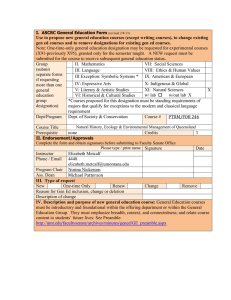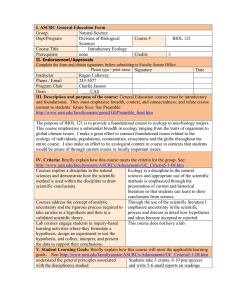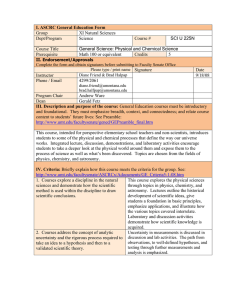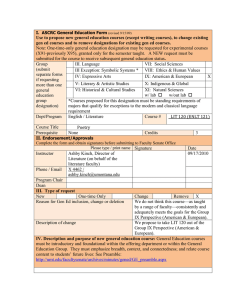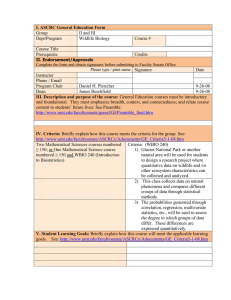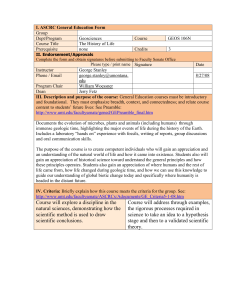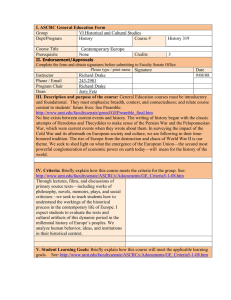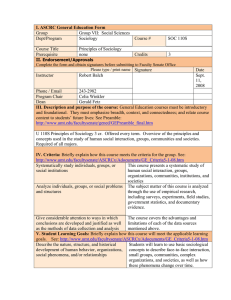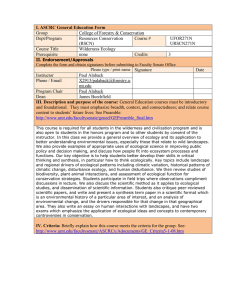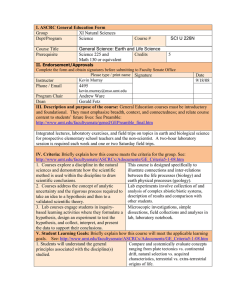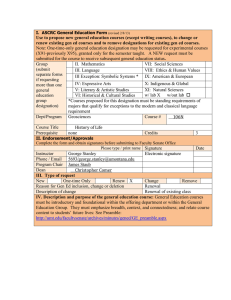Use to propose new general education courses (except writing courses),... gen ed courses and to remove designations for existing gen...
advertisement
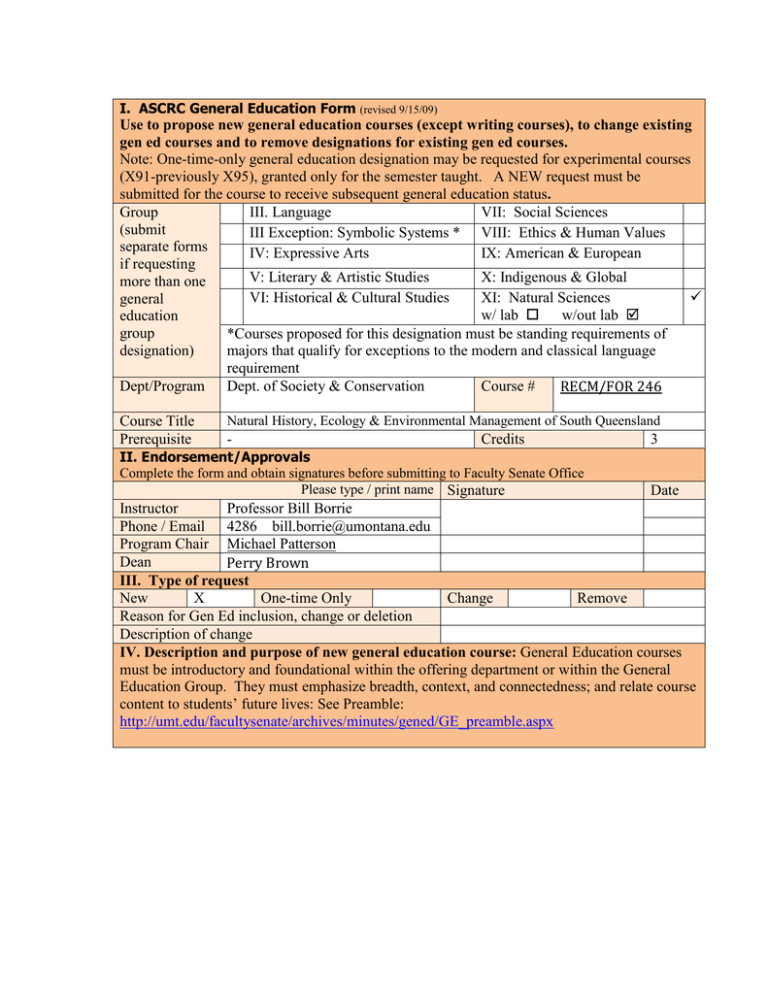
I. ASCRC General Education Form (revised 9/15/09) Use to propose new general education courses (except writing courses), to change existing gen ed courses and to remove designations for existing gen ed courses. Note: One-time-only general education designation may be requested for experimental courses (X91-previously X95), granted only for the semester taught. A NEW request must be submitted for the course to receive subsequent general education status. Group III. Language VII: Social Sciences (submit III Exception: Symbolic Systems * VIII: Ethics & Human Values separate forms IV: Expressive Arts IX: American & European if requesting V: Literary & Artistic Studies X: Indigenous & Global more than one VI: Historical & Cultural Studies XI: Natural Sciences general w/ lab w/out lab education group *Courses proposed for this designation must be standing requirements of designation) majors that qualify for exceptions to the modern and classical language requirement Dept/Program Dept. of Society & Conservation Course # RECM/FOR 246 Course Title Prerequisite Natural History, Ecology & Environmental Management of South Queensland - Credits II. Endorsement/Approvals Complete the form and obtain signatures before submitting to Faculty Senate Office Please type / print name Signature 3 Date Instructor Professor Bill Borrie Phone / Email 4286 bill.borrie@umontana.edu Program Chair Michael Patterson Dean Perry Brown III. Type of request New X One-time Only Change Remove Reason for Gen Ed inclusion, change or deletion Description of change IV. Description and purpose of new general education course: General Education courses must be introductory and foundational within the offering department or within the General Education Group. They must emphasize breadth, context, and connectedness; and relate course content to students’ future lives: See Preamble: http://umt.edu/facultysenate/archives/minutes/gened/GE_preamble.aspx This course focuses on the natural history and environmental management of Australia’s natural resources through lectures, field trips, active participation, presentations and seminars, research projects and field exercises. Queensland has a wonderful year-round tropical climate and boasts some of the most diverse and remarkable natural resources in the southern hemisphere. Our program will be based at the University of Queensland in Brisbane, and will include two weeks in the field visiting a network of national parks, reserves, offshore islands, and coastal areas of southeast Queensland. These include time spent snorkeling and studying the marine wildlife of the Great Barrier Reef, exploring Carnarvon Gorge National Park learning about dry sclerophyll forests, and hiking the rainforests of Lamington National Park to experience first-hand some of the diverse wildlife and flora of Australia. V. Criteria: Briefly explain how this course meets the criteria for the group. See: http://umt.edu/facultysenate/documents/forms/GE_Criteria5-1-08.aspx 1. Courses explore a discipline in the natural Students will have the opportunity to study sciences and demonstrate how the scientific with field botanists, marine biologists, method is used within the discipline to draw zoologists and environmental educators to scientific conclusions. understand the natural history, ecology, and conservation biology of four distinct ecosystems of SE Queensland. The implications of biology and ecology for human utilization and conservation of natural resources is emphasized. 2. Courses address the concept of analytic Four research projects introduce students to uncertainty and the rigorous process required to the challenges, limitations and imprecisions take an idea to a hypothesis and then to a of ecological data collection. Identification validated scientific theory. and refinement of testable hypotheses is required prior to data collection, along with consideration of prior ecological understanding is required. 3. Lab courses engage students in inquiry-based While not proposed as a lab course, three of learning activities where they formulate a the four research projects require groups to hypothesis, design an experiment to test the formulate their own hypotheses and research hypothesis, and collect, interpret, and present design prior to data collection. Two of the the data to support their conclusions. projects involve verbal presentation of their data along with conclusions and implications. Three projects require preparation of field research reports. VI. Student Learning Goals: Briefly explain how this course will meet the applicable learning goals. See: http://umt.edu/facultysenate/documents/forms/GE_Criteria5-1-08.aspx 1. understand the general principles associated General ecological, biological and with the discipline(s) studied geological principles are introduced alongside the specific natural history of the four specific ecosystems studied. 2. understand the methodology and activities scientists use to gather, validate and interpret data related to natural processes Students will learn the scientific methods used by biologists and ecologists in their study of natural processes, including development of scientific hypotheses, quantitative measurement, scientific observation techniques, and the interpretation of data. 3. detect patterns, draw conclusions, develop Working with field guides and faculty, conjectures and hypotheses, and test them by students are introduced to scientific appropriate means and experiments; observation skills, field measurement protocols and learn current ecological principles and theories. Three small research projects involve identifying and developing testable hypotheses, along with design of appropriate data collection methods. 4. understand how scientific laws and theories Ecological data and published research are verified by quantitative measurement, results are considered for three ecosystems scientific observation, and logical/critical (rainforest, reef, outback) along with the reasoning; current scientific understandings derived from those data. 5. understand the means by which analytic Several current environmental issues (eg. uncertainty is quantified and expressed in the coral bleaching caused by global climate natural sciences change, fire climax communities, etc.) are considered in the context of previous knowledge and theories compared to current understandings. The implications of uncertainty and the tentativeness of analytical conclusions are discussed, particularly in the context of environmental decision-making. VII. Justification: Normally, general education courses will not carry pre-requisites, will carry at least 3 credits, and will be numbered at the 100-200 level. If the course has more than one pre-requisite, carries fewer than three credits, or is upper division (numbered above the 200 level), provide rationale for exception(s). VIII. Syllabus: Paste syllabus below or attach and send digital copy with form. The syllabus should clearly describe how the above criteria are satisfied. For assistance on syllabus preparation see: http://teaching.berkeley.edu/bgd/syllabus.html Attached. Please note: Approved general education changes will take effect next fall. General education instructors will be expected to provide sample assessment items and corresponding responses to the Assessment Advisory Committee.
